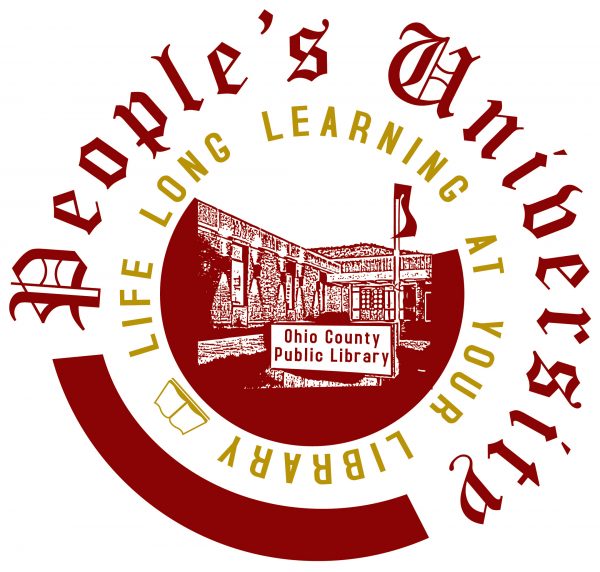In recognition of the elemental importance of our water to all life and human activity, including lifelong learning, the Ohio County Public Library and the non-profit Capstone Group have partnered to offer a People’s University series that asks the questions: What is the state of the watersheds in Wheeling and in our state and what can be done to safeguard or improve them?
“West Virginia Watersheds” classes will meet on four consecutive Tuesday evenings at 7 p.m. in the library’s auditorium beginning Tuesday, Sept. 4. The series is organized by the non-profit Capstone Group Inc. in cooperation with the Institute of Water Security and Science at West Virginia University. The Capstone Group is based in Wheeling and is led by Manetta Calinger and Laurie Ruberg. Funding for this series is provided by the Walmart Foundation and its affiliate store in Triadelph ia. Additional support is provided by Ohio County Public Library.
ia. Additional support is provided by Ohio County Public Library.
The full schedule for the People’s University — West Virginia Watersheds is as follows:
CLASS 1: TUESDAY, SEPT. 4 — WATER: THE SOURCE OF LIFE
Water issues underlie everything in the natural world, from quality of life and health to economics, politics and culture. Water is common ground for all disciplines. Recognizing its elemental importance to our world, nation and state, West Virginia University founded the Institute of Water Security and Science (IWSS) in 2016, to promote stewardship of water resources. This IWSS presentation will emphasize the ways in which we utilize freshwater and the importance of maintaining clean sources of water. West Virginia is home to over 32,000 miles of streams, and pollutants we put into these streams ultimately impact the drinking water for millions of people across the U.S. How much freshwater exists on planet earth? How many miles of stream in West Virginia have been impacted by various pollutants? Can we remedy polluted waterways? Why is it important for us to clean up and maintain freshwater sources? This presentation will help provide the answers to these questions and emphasize the importance of West Virginia’s water resources.
This presentation by is supported in part by the National Science Foundation under Award Number OIA-1458952.
Instructor Dr. Elliott Kellner serves as the associate director and assistant research professor in the Institute of Water Science and Security at West Virginia University. Kellner is a physical hydrologist with six years of hydrological field research experience, including watershed hydrology, groundwater hydrology, groundwater modeling and environmental soil chemistry. Kellner researches a wide range of topics related to physical hydrology, hydro-biogeochemistry and hydroclimate variability. He is interested in the influences of subsurface hydrology on aquatic and terrestrial ecosystems, and the interactions of competing factors (e.g. anthropogenic and climate impacts) contributing to patterns of water quality and quantity.
CLASS 2: TUESDAY, SEPT. 11 — WHEELING WATER
This presentation will begin with a discussion of the history of Wheeling water and how technology has improved in 100 years. As the superintendent of the Wheeling Water Treatment Plant, Lori Siburt will provide a brief description of the Consumer Confidence Report (CCR), with handouts, and participants will have the opportunity to ask questions about the report. This will be an interactive session designed to help everyone understand the information presented in the annual consumer report. There will be an overview of the new $30 million Membrane Plant and how it has improved the quality of our water. The presentation will conclude with a discussion of what is next for the water industry and Wheeling water in general.
Siburt was hired by the Wheeling Water Treatment Plant in May 2002 as a lab technician and water operator. She came to the city with a background in water and wastewater and 15 years as a lab technician. She is a Class IV Water Operator certified with the state of West Virginia, she is certified with the W.Va. Microbiology Lab for bacteriological testing and has a bachelor’s degree in chemistry from Wheeling Jesuit University. She was promoted to senior lab technician in 2012, plant manager in 2014 and superintendent in 2017. She works closely with ORSANCO regarding Ohio River quality issues and is a member of American Water Works Association. She was the plant manager during the construction of the new $30 million Membrane Treatment Plant.
CLASS 3: TUESDAY, SEPT. 18 — RESTORING APPALACHIAN RIVER NETWORKS IN A CHANGING CLIMATE
River restoration seeks to recover aquatic ecosystem functions lost from historic impacts. However, restoration actions must also consider the potential complicating effects of climate change. Dr. J. Todd Petty will present the results from two studies of brook trout restoration in the Appalachian region. First, he will describe a process for identifying watershed restoration priorities within the context of expected impacts from climate change. This process can be used to direct resources towards restoration actions that have the greatest potential for producing benefits to brook trout populations under threat from climate change. Second, he will present results from a long-term assessment of restoration actions in the upper Shavers Fork, W.V.a, designed to recover brook trout populations and build resilience to future impacts from climate change. Results indicate that targeted watershed scale restoration actions can be used to re-establish connectivity among tributary populations and larger, productive main stem rivers that may be vulnerable to future warming. The synthesis of these two studies together is used to propose a path for conserving cold-water ecosystems in the face of climate change.
This presentation is supported in part by the National Science Foundation under Award Number OIA-1458952 and the Institute of Water Security and Science at WVU.
Petty is a professor of aquatic sciences at WVU and serves as associate dean of academic affairs in the Davis College of Agriculture, Natural Resources & Design.
CLASS 4: TUESDAY, SEPT. 25 — A ROLE FOR THE CITIZEN SCIENTIST
What does citizen scientist mean? The term citizen scientist refers to scientific work undertaken by members of the general public, done under the direction of professional scientists and scientific institutions. Many data sources are available to help citizens understand their local drinking water quality as well as the quality of their local streams, rivers and lakes. The GLOBE citizen science project provides expert-created guidelines for youth and adult citizen science water quality testing as well as data sharing. This presentation will give an overview of how knowledgeable citizen science initiatives can address the general public’s disconnect from locally meaningful data, media misrepresentation or incomplete reporting of water quality issues, and problems related to interpretation of data presented in isolation of primary watershed research. This talk will suggest available resources to support and guide citizen scientists interested in W.Va. water conditions and community benefits of citizen science actions.
There are three instructors for class four: Dr. Dorothy Vesper, Howdy Henritz and Dr. Ben Hitt.
Vesper is associate professor of geology, WVU. She is a low-temperature geochemist with a focus on karst hydrogeology, temporal changes in water quality (diel and storm), high-CO2 waters, metal geochemistry, thermal-mineral springs, coal-mine drainage, and how contaminant move in karst aquifers. Much of her recent research considers the relationship between inorganic carbon and sulfur in natural waters.
Henritz is president of the Indian Creek Watershed Association in Monroe County, W.Va. Established in 1996, the IWCA’s mission is the preservation and protection of Monroe County’s abundant, pure water. The IWCA provides education and outreach activities that lead to citizens’ involvement with watershed issues and local planning efforts are the key to water protection within the watershed. Henritz started the Sweet Springs Valley Water Company in 1990 and managed the company from 1990-2014. He has been active in the IWCA since its inception.
Hitt is a nationally recognized expert in data mining and pattern recognition solutions. He is the inventor and patent holder of numerous algorithms and computer programs. Hitt’s works include inventions for analyzing disparate data streams, near real-time analysis of audio and text information streams, applications for the detection of credit card fraud, optimization solutions for direct marketing problems and pattern recognition algorithms for early detection of disease. He has published over 40 scientific papers based on his research and development experience. Presently, he is assistant professor of Industrial Electronics at Belmont College in St. Clairsville
This presentation is supported in part by the National Science Foundation under Award Number OIA-1458952 and the Institute of Water Security and Science at WVU.
In keeping with the mission of public libraries as sanctuaries of free learning for all people, the Ohio County Public Library created The People’s University, a free program for adults who wish to continue their education in the liberal arts. The People’s University features courses—taught by experts in each subject—that enable patrons to pursue their goal of lifelong learning in classic subjects such as history, science, philosophy, and literature.
All classes are free and open to the public. Patrons may attend as many classes as they wish. There are no tests or other requirements. To register for the People’s University: “World War II” email the library at lunchwithbooks@yahoo.com, call 304-232-0244 or visit the Reference Desk.



